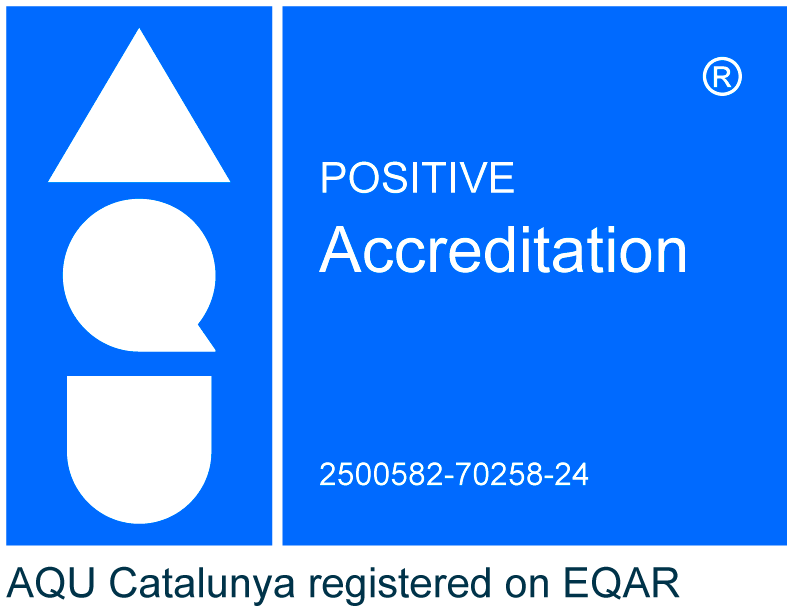Bacherlor’s Degree in Physiotherapy
We innovate to offer you the best
Work at renowned hospitals and medical centres
The path to professional success. Take it.
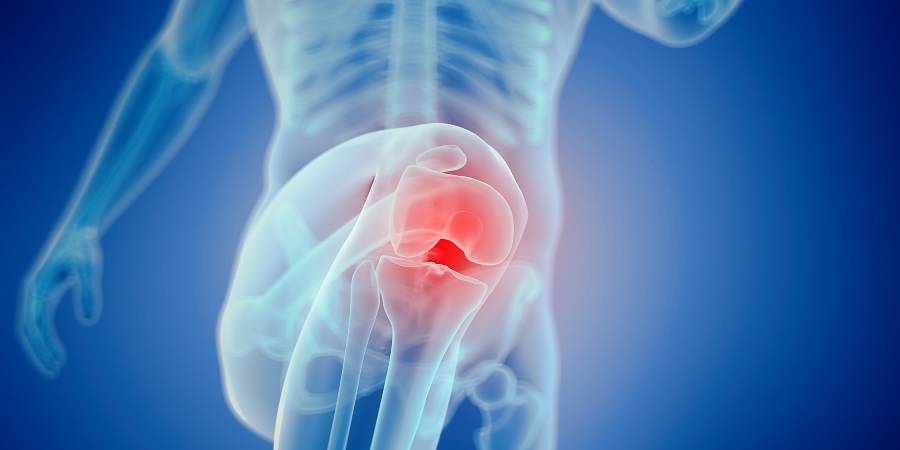
New curriculum and methodologies
The Bachelor's Degree in Physiotherapy from UIC Barcelona is a pioneer in methodologies such as the OSCE and subjects like pharmacology or diagnostic imaging.
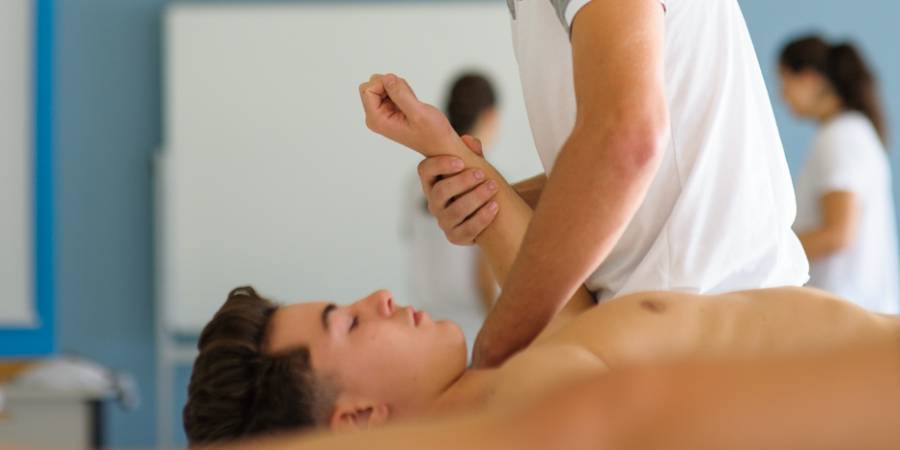
Clinical placements at physiotherapy centres
More than 800 hours of mandatory practice so that you can join the work market successfully and with the necessary analysis and reflection skills and find the best solutions for patients.
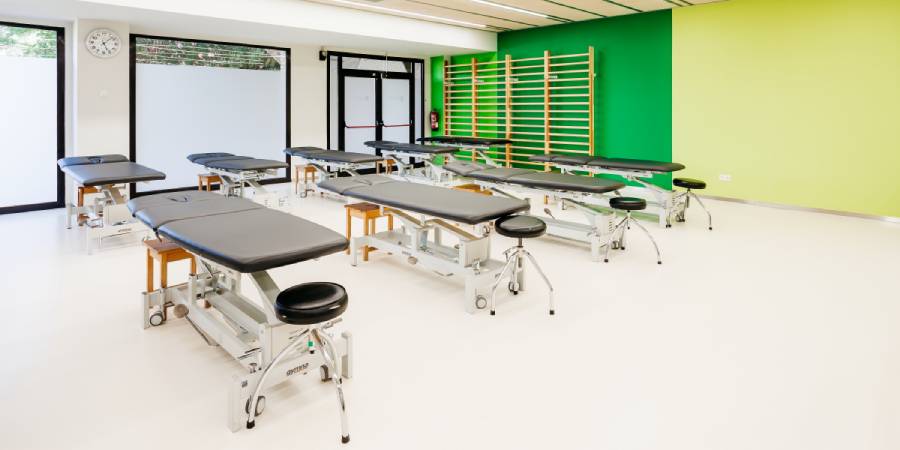
Facilities with state-of-the-art technology
You will be able to practice your knowledge in the more than 1,000m2 of gyms without leaving the faculty.
Prepare for more career opportunities
At UIC Barcelona, we understand the importance of theoretical and practical training so that you become a good professional.
- Specialise in physiotherapy applied to traumatology
- Neurology
- Cardiopulmonary physiotherapy
- Rheumatology
- Gynaecology
- Sports physiotherapy
- Paediatrics
- Geriatrics
- Teaching
- Management
- Research
- Orthopaedic manual physiotherapy
Students tell you their experience

“What led me to study Physiotherapy at UIC Barcelona, was definitely the facilities and resources that the University offers. To have the privilege to study anatomy with real bodies from the start is a huge help throughout the degree. Practice at the gyms is very comfortable thanks to the space, materials, but especially the help of the faculty. This university takes care of its students by training its lecturers. The friendliness between lecturer and student is great, thank you.”
Àlex Corbera Raber
Physiotherapy Degree student

“What I like the most about UIC Barcelona is the chance to see all the theory learnt in the laboratory with real bodies. I really appreciate the personal touch they have and the way the lecturers teach the lessons in a way that transmits knowledge but also the desire to learn more."
Marc Torrà
Physiotherapy Degree student
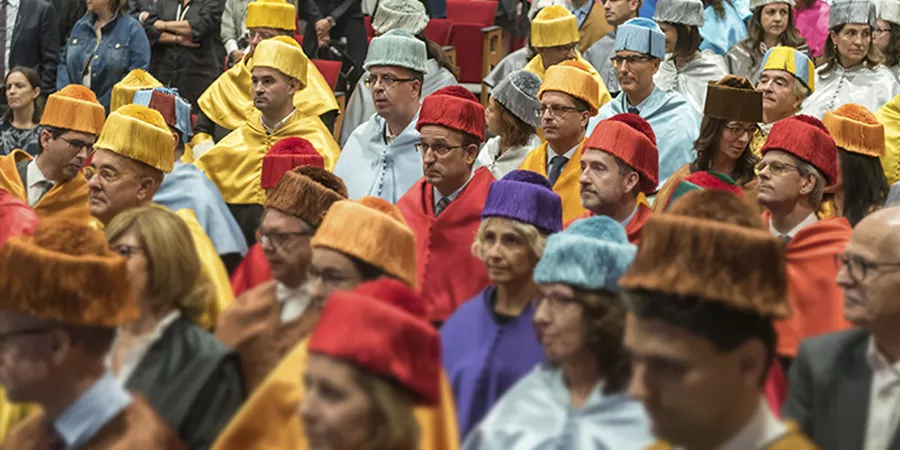
Professors active in their field and Research
The Bachelor’s Degree in Physiotherapy places a great deal of importance on research, which is why our teaching methodology is geared towards immersing our bachelor’s degree students in a harmonious coexistence with research.
In addition, they all undertake extensive research activities both at and outside the University.
Additional information
Presentation
The Degree Programme in Physiotherapy in UIC Barcelona prepares participants to enter the workforce by teaching them the reflective and analytical skills which are necessary in order to work with patients to find the best solutions.
Physiotherapists have the opportunity to improve the overall quality of life of their patients, and are therefore responsible for maintaining regular contact with patients and other health professionals.
For that reason, it is important that students develop a sense of responsibility and commitment faced with our ever-changing society, while at the same time fostering the self-critical skills that enhances their learning. The UIC places a strong emphasis on teamwork in order to ensure successful interdisciplinary collaboration throughout students’ professional careers.
In order to achieve these ambitious goals, the programme offers a flexible and up-to-date curriculum with a close connection between theoretical content and practical classes in all areas of knowledge. Students also have the opportunity to carry out professional, clinical practica in physiotherapy centres and rehabilitation facilities.
Objectives
- To find out about and understand the morphology, physiology, pathology and behaviour of both healthy and unhealthy people, in both their natural and social state
- To find out about and understand the science, models, techniques and tools on which Physiotherapy is based, formulated and developed
- To know about and understand the methods, procedures and physiotherapeutic actions aimed at therapy itself, applying it in the clinic for re-education or functional recovery purposes, or for carrying out activities aimed at the promotion and maintenance of good health
- To acquire sufficient clinical experience which: provides intellectual, technical and manual skills, facilitates the incorporation of ethical and professional values, and develops the ability to incorporate the knowledge obtained, in such a way that, once their studies are completed, students know how to apply them both in specific clinical cases in hospitals and outside hospitals, as well as in actions involving primary and community care
- To evaluate the functional state of the patient, taking physical, psychological and social aspects into consideration
- To evaluate and diagnose Physiotherapy care according to the rules and through the use of verification tools which have been recognised at an international level
- To set out a plan for Physiotherapy intervention with attention paid to criteria of suitability, validity and efficiency
- To execute, manage and coordinate the plan for Physiotherapy intervention, using one's own therapeutic tools and paying attention to the individual situation of the end-user
- To evaluate the evolution of the results obtained through the treatment in relation to the goals set out
- To write up the Physiotherapy release report once the objectives set out have been met
- To provide efficient Physiotherapy involving comprehensive care for patients
- To intervene in areas of the promotion and the recovery of good health, as well as prevention
- To know how to work in a professional team as the basic unit into which professionals and other staff from healthcare organisations are organised, either in a unidisciplinary or multidisciplinary way
- To incorporate the ethical and legal principles of the profession into professional practice as well as the community and social aspects when making decisions
- To participate in the creation of Physiotherapy care protocols based on scientific evidence, promoting professional activities which boost research into Physiotherapy
- To carry out physiotherapy interventions based on comprehensive healthcare which involves multi-professional cooperation, the incorporation of processes and the continuity of care
- To understand the importance of updating the knowledge, skills, abilities and attitudes included within the professional competences of the physiotherapist
- To acquire clinical management skills which include the efficient use of healthcare resources and carry out planning management and control activities in the care units to which attention is paid in the area of physiotherapy and its connection with other healthcare services
- To communicate effectively and clearly with users of the healthcare system as well as other professionals both verbally and in written form
Prospective students
All candidates who meet the general requisites and have completed the required access routes will be able to apply for entry. However, the recommended background is that of a person with previous studies in the area of health sciences, with a vocational attitude in relation to science and health and the following skills:
- Discipline, memory and dedication
- Agile decision-making
- Psychological qualities and empathy
- Emotional balance
- Interest in research
- Responsibility and observation skills
- Teamwork
- Sensitivity to the pain of others
- Resilience
Competences. Course objective
Academic accreditation
Graduado o Graduada en Fisioterapia por la Universitat Internacional de Catalunya.
Course directors and coordinators
Director of the Physiotherapy Department and Vice-Dean of the Faculty of Medicine and Health Sciences
Dr. Daniel Romero Rodríguez
Teachers
- ALONSO-RODRÍGUEZ PIEDRA, Javier
- AMOR BARBOSA, Marta
- ARES BRAGE, Laura
- BAGUR CALAFAT, Maria Caridad
- BARASTEGUI FERNÁNDEZ, David
- BARRA LÓPEZ, Martín Eusebio
- BAYÉS MARIN, Ivet
- BELLVER VIVES, Montserrat
- BLANCO DE TENA DAVILA, David
- BLANCO RATTO, Laia
- BOADA ROVIRA, Mercè
- CABANAS VALDÉS, Rosa María
- CABANILLAS BAREA, Sara
- CADELLANS ARRÓNIZ, Aïda
- CANET VINTRÓ, Máxim
- CANTERO FORTIZ, Yahveth
- CARRASCO URIBARREN, Andoni
- CARRIÓN SEVILLA, Raúl
- CASASAYAS COS, Oriol
- CLIMENT SANZ, Carolina
- CORBALAN RUIZ, Anna
- CORDERO OTERO, Gaël
- COSTA CARVALHO, Joffrey
- CUADRA LLOPART, Leonor
- DANTONY, Flora Loredane
- DELGADO GARCIA-MENOCAL, Jose Angel
- DEL HIERRO DIES, Jose
- DE MIGUEL MATEOS, Marta
- DOMÈNECH I GARCIA, Georgina
- EVANS JUSTAMANTE, Sally Elizabeth
- FAGUNDES DONADIO, Marcio Vinicius
- FARRIOLS ARIMONT, Ivet
- FRANCISCO SALGUEIRO, Carina
- GARCÍA GÓMEZ, María Carmen
- GARCÍA ORTÚN, Felícitas
- GASCÓN GARCÍA, Jorge
- GOMMON, Natalie
- GONZÁLEZ GONZÁLEZ, Julio
- GONZÁLEZ MARRÓN, Adrián
- GRÀCIA I TEXIDÓ, Meritxell
- JALINOT, Camille
- JIMÉNEZ JIMÉNEZ, Javier
- KAUFFMANN, Stéphanie
- KNIGHT, Janine Gwendolyn
- LASTRA MARTÍNEZ, Andrea
- LINERO MASCLANS, Francesc
- LLOMBART CALCENA, José Miguel
- LÓPEZ CAJO, David
- LÓPEZ DE CELIS, Carlos
- LÓPEZ MESSEGUER, Albert
- MACIÀ MARTÍ, Andrea
- MACPHERSON MAYOL, Ignacio
- MADRUGA PARERA, Marc Pere
- MANCEBO MOLINA, Marta
- MANCHOLA GONZÁLEZ, Jahn Dubery
- MEDINA HENRÍQUEZ, Paula Javiera
- MEMBIELA GUIX, Marc
- MESSAGGI SARTOR, Monique
- MET, Yagmur Elif
- MOLLER PARERA, Ingrid
- MORALES BENITO, Isabel
- MOURE ROMERO, Lourdes
- NAVARRO, Emiliano
- O'BRIEN, Adam
- OLIVER CASANOVA, Xavier
- OLIVÉ VILÁS, Ramon
- ORTEGA CEBRIÁN, Silvia
- ORTEGA I MARTÍNEZ, Anna
- ORTIZ I MIGUEL, Sara
- PACHECO ARAJOL, Laura
- PACHECO DORIA, Mauricio
- PANTALEÓN HERNÁNDEZ, Daniel
- PÉREZ GUILLÉN, Silvia
- PÉREZ RUBIO, María
- PIULACHS LOZADA-BENAVENTE, Ignasi
- POL VALLS, Francesc
- PUJOL MEDINA, Eduardo
- PUYALTO DE PABLO, Paloma
- RAGAZZI, Paolo
- RAMÍREZ GARCÍA, Inés
- RAMÍREZ MORENO, José
- RAMON BELMONTE, Maria Antònia
- RAMOS SERRANO, Berta
- RODRIGUEZ RODRIGUEZ, Sergi
- RODRÍGUEZ RUBIO, Pere Ramón
- RODRIGUEZ SANZ, Jacobo
- ROMERO RODRÍGUEZ, Daniel
- SALAZAR PÉREZ, Fernanda
- SÁNCHEZ FERNÁNDEZ, Juan José
- SÁNCHEZ MARTÍNEZ, Néstor
- SÁNCHEZ TORRES, Lorena
- SERRA LLOBET, Pol
- SZWEJKOWSKI, Andrew Dominic
- TEJERO LÓPEZ, Lluís
- TOST VALLS, Jose Ramon
- TRIBÓ ALONSO, Albert
- VALVERDE VÁSQUEZ, Ricardo
- ZABALZA CERDEIRIÑA, Miguel
- ZÁRATE TEJERO, Carlos Antonio
Internship
The clinical stays aim to give the student the possibility and the ability to come into contact with the health service user, and also the possibility to learn about the professional health system, its organizational structure and the real role they will play as a physiotherapist within this system.
Clinical stays also provide the student with professional contact and the application of the theoretical and practical knowledge acquired during their training period. These practices will shape the profile of the future professional physiotherapist.
Objectives
There are two types of objectives: general objectives that are common in any internship period, and the specific objectives acquired and expanded depending on the characteristics of the centre.
General Objectives
- Know the different areas of action of the physiotherapist in the health care field (promotion, prevention, rehabilitation, reintegration, etc.) through the therapeutic procedures he can carry out.
- Know how to optimise the work resources available to you so that in the future you will be able to develop your professional role by adapting to the characteristics of the work environment.
- Know the role of the physiotherapist within a multidisciplinary team and acquire a working methodology.
- Develop the appropriate social skills to be able to establish optimal relationships between professionals, patients and family.
- Encourage action within a legal and official framework, respecting the profession and its ethical code (see ethical code in Materials).
- Analyse the progressive lines of the profession and the adaptation to the current, scientific and social-labour context.
- Reason with the tutor physiotherapist to interrelate the theoretical and practical concepts studied.
Specific Objectives
- Know how to use the health care user related-information systems (pulling data from the clinical history and making a physical therapy functional assessment sheet) extrapolating these necessary data in the physiotherapist’s activity.
- Know the composition and distribution of the assigned physiotherapy department’s tasks and activities, based on its characteristics.
- Know the ethical code and attitude to maintain towards the patient, the family and the healthcare staff (See Materials section).
- Know how to detect special situations that may arise and give a correct and effective response.
- Develop the knowledge, skills and attitudes learned regarding the care procedures in observation, assessment and therapeutic action.
- Apply skilfully and judicially manual and instrumental therapeutic techniques.
Structure of Clinical Stays in the Bachelor’s Degree in Physiotherapy
Clinical stays (EC) for the Bachelor’s Degree in Physiotherapy at UIC Barcelona take place in the Module called Supervised Clinical Stays, with an academic weight of 40 ECTS credits (1000h) and are mandatory* (PE) to obtain the Bachelor’s Degree in Physiotherapy.
These 40 credits are developed in eight 5-credit subjects, which takes place during the last 2 years of the programme; EC1-EC3 are carried out in the 3rd year, whereas EC4-EC8 are carried out during the 4th year of the Bachelor’s Degree in Physiotherapy.
* PE: External practice
Health Care Centres
- Traumatological/Rheumatological Physiotherapy
- -Corporación *Fisiogestión
- *MC Mutual
- Clínica *Kineopatik
- *Cerva (Rehabilitation of the Vallès)
- *Iriteb
Hospital Physiotherapy
- Hospital Asepeyo Sant Cugat
- Grup QuirónSalud hospital network
- Hospital Universitari MútuaTerrassa
- Hospital de *Bellvitge
- Hospital General de Catalunya
- Institut Català de la Salut
- Institut Català d’Oncologia
Neurological Physiotherapy
- Neurorehabilitation Center
- Centre Posthospitalari de Rehabilitaciò Manfred
- Fundación Step by Step
- Hospital Pere Virgili Hospital
Pediatric Physiotherapy
- Children's Hospital – Grup Delfos
- Hospital Sant Joan de Deu
- Fundació *Aspace Catalunya
Sports Physiotherapy
- *Eurosport
- *reQ
- Resport Clinic
- Residència de Deportistas Joaquim *Blume
Geriatric Physiotherapy
- Residencias *Sanitas Mayores
- Residencia *DomusVi Villaralbo
Home Physiotherapy
- Centre de Medicina Correctiva
Physiotherapy in Primary Care
- RH South Metropolitan Area
On the other hand, the Bachelor’s Degree in Physiotherapy has other centres with which an agreement has already been established to develop ECs in different locations around the world.
Final Degree Project
The Final Degree Project (TFG) Module materialises in a single matter and subject, which consists inthe elaboration of a research project or report supervised by one or several instructors of the bachelor’s degree programme. These papers or reports must be defended before a jury as established by RD1393/2007.
The TFG is an independent and individual project that each student will prepare under the guidance of a tutor whose role will be to support and facilitate the learning process. This project will allow the student to show the educational content received and the skills acquired associated with the bachelor's degree programme in a comprehensive manner.
When designing the curriculum for the bachelor’s degree and the conceptualisation of the final degree project at the Universitat Internacional de Catalunya, we have considered that in order to offer high-quality personalised attention, the physiotherapist must first be able to interpret the scientific contributions that generate new perspectives on intervention and research, and also able to apply the different scientific methodologies in the construction of knowledge. Secondly, in response to the growing social demand for efficiency and effectiveness in health care, physiotherapists must not only be able to translate the results of scientific research to professional practice, but they must also actively and productively intervene in the different stages of scientific research processes. Therefore, training at the Universitat Internacional de Catalunya is also aimed at equipping the future physiotherapist with the skills needed to incorporate evidence-based physiotherapy to professional practice and become part the scientific progress in this discipline. For this important and specific reason, the subject "Design and Tools of Evidence-Based Physiotherapy Projects" has been proposed within the curricular path that will provide the foundation for the final degree project at a methodological level.
Pre-requisites
- To defend the TFG, the student must have completed and passed the first three academic years of the bachelor’s degree programme.
- To enrol in the TFG, the student must have enrolled in the rest of the degree programme subjects.
Objectives
The main objective of this topic is for the student to demonstrate that they have acquired the knowledge, skills and competences in all the degree programme subjects in one project, and able to integrate them into a single document and acquire knowledge about their specific topic. The student must also demonstrate before a jury their ability to present and communicate the most relevant aspects of their project.
Research
Research in the Department of Physiotherapy is divided into three thematic topics. The first is related to the evaluation of the effects of physiotherapeutic interventions related to the application of manual and instrumental techniques and active exercise. The second examines the use of therapeutic exercise and movement control techniques to promote neuromotor development and treat of the locomotor and nervous system disorders. The third focuses on the assessment of functional and aerobic capacity, as well as the use of physical exercise as a rehabilitation tool in patients with cardiorespiratory and metabolic diseases.
The Department of Physiotherapy will be using the Biomechanics and Exercise Physiology Laboratory to carry out the studies.
You can check the details, objectives and composition of the three work groups exploring these areas here.
Prerequisites & admissions
Application for admissions
To pre-register for undergraduate studies at UIC Barcelona, you will need to complete the application form available via the following link:
Required documentation
It is recommended that international students willing to join the degree in Physiotherapy and coming from non-Spanish speaking countries have a Spanish level equivalent to level B2.
Entrance exam results
Reservation and enrolment
In order to reserve a place on the programme, admitted candidates must pay 20% of the first year fee upon receiving their letter of acceptance.
The remaining 80% is due after enrolment.
For more information:
Access routes
Programme applicants may come to UIC Barcelona from different academic backgrounds. Click on the following link for detailed information on the route most pertinent to you:
Grants & financial aid
Grants
UIC Barcelona offers various fellowships supported by both public institutes (MEC or AGUAR) as well as private UIC Barcelona funds.
For further information, please check with our admissions department:
Financial aid
Each payment method is adhered to the specific financing conditions of each degree programme.
Please see the attached document for details on these conditions:
Discounts
Those seeking undergraduate degrees at UIC Barcelona may be eligible for different discounts depending on their circumstances.
Faqs
General information
How many places are available in the Bachelor’s Degree in Physiotherapy?
90 places.
How much does the first year of the Bachelor’s Degree in Physiotherapy cost?
Please visit uic.es/salud for the most up-to-date information.
Do students need to buy books for classes?
No, the teaching material can be found on the university’s digital platform and in the library.
The price includes the gown, scrubs and size for the stretcher.
Does UIC Barcelona offer any grants or financial aid for the Bachelor’s Degree in Physiotherapy?
You can find out all the various options including grants, discounts, and fee waivers, as well as the terms and conditions for loans
on our website.
If you have an average mark of 8 or higher in your first year of upper secondary education or a 9 or higher in your first year of Higher Vocational Education and Training (CFGS), you are eligible for a Grant for Academic Excellence (uic.es/grants), which entitles you to an 80% discount every year of study.
What is the class timetable?
Theoretical-practical classes are held in hours between 8.00 a.m. and 3.00 p.m. from Monday to Friday
When do the practicums start?
Practical sessions will be carried out in small groups in our facilities (gymnasiums) in all four years of the degree programme. Clinical residences or hospital placements will start in third year.
Acces routes
Can I take the entrance examinations if I come from a social science, humanities or artistic upper secondary track?
Yes.
Can I take the entrance examinations if I have taken a Higher Level Vocational Training Course (CFGS) not related to health?
Yes.
Do I have a validated subject if I have started university studies in the area of health?
If you have begun but not finished your university studies or have requested an academic record transfer, you may request that your previous academic merits be recognised once you have been accepted. In order to do so, you must provide a series of documents within the established timeframe.
If I already have a university degree, do I still need to take the entrance exams?
Yes, to gain admission into the Bachelor’s Degree in Physiotherapy, you must take the entrance exams regardless of your situation.
Tests and admission processes
What is the cut-off mark for admission into the Bachelor’s Degree in Physiotherapy?
As this is a private university, there is no cut-off requirement. Admission into the bachelor’s degree will depend on the outcome of the relevant entrance exams and the average mark from your academic record.
How are the marks on my academic record and the entrance exams weighted?
50% of the academic record, 40% of the admission tests and 10% of the personal interview.
What do the entrance exams involve?
They consist of:
- A psychometric reasoning test
- An English test
- A general culture test
- Personal interview
Can I choose the date of the Entrance Examination?
You can ask for a specific date, however you must wait from confirmation from the Information and Admissions Service who, once they have looked over your documentation, will confirm the exam dates via email.
Can I look up past papers for the entrance examinations?
We do not provide past papers from previous years. And in the case of the psychometric test you can search on the internet for examples so you can have an idea of the type of test it is.
Is the exam multiple choice?
Yes.
What level of English is required for the exam?
Higher than B1.
What are the exam times?
The tests are done online from 9.00 a.m. to 11:00 a.m. on the date indicated.
When will I find out the results of the entrance exams?
The results will be sent to you by e-mail within a period of 10 working days after taking the exams
If I am ‘not admitted’ can I attend the next sitting during the same academic year?
No, you can only attend one sitting per academic year
If I am on the waiting list, when will I find out the final results?
The waiting list will definitively close two weeks after the start of classes (end of September).
It will be impossible to know the chance you have of being accepted until all six sittings have been held and the respective waiting lists have been cross-checked. What’s more, until the cut-off marks are published by the state universities, there will be little movement on the waiting lists.
If I have been admitted what is the next step?
You will receive a letter of admission containing information about the next steps to take in order to reserve a place on the course, which corresponds to 20 % of the fee for first year. The remainder is payable in three payments: 40% at the time of enrolment (throughout the month of July), 20% at the end of January and the last 20% at the end of March.
If I reserve a place and then decide not to study at UIC Barcelona, will the reservation fee be reimbursed?
The reservation fee will only be fully reimbursed in the event you do not have the academic requirements to complete enrolment.
This clause is laid out in the General Terms and Conditions.
International mobility
Study abroad temporarily
As a student in this degree programme, you may complete part of your degree or a work experience placement abroad and receive academic recognition.
Spend a semester or a full academic year at one of your Faculty’s partner universities or find a company abroad to do an internship. You may also:
- Attend the Berkeley Summer Sessions (extracurricular activity) the world’s best public university.
For information about everything you need to do before, during and after your mobility stay, check out the "Study abroad" section and download all the documentation specific to your Faculty:
Study with us temporarily
If you are studying at another Spanish or foreign university, you can come to UIC Barcelona to study temporarily for one semester or a full academic year.
Visit the “International exchange students site” for more information and, download here all the specific documentation of this faculty:
